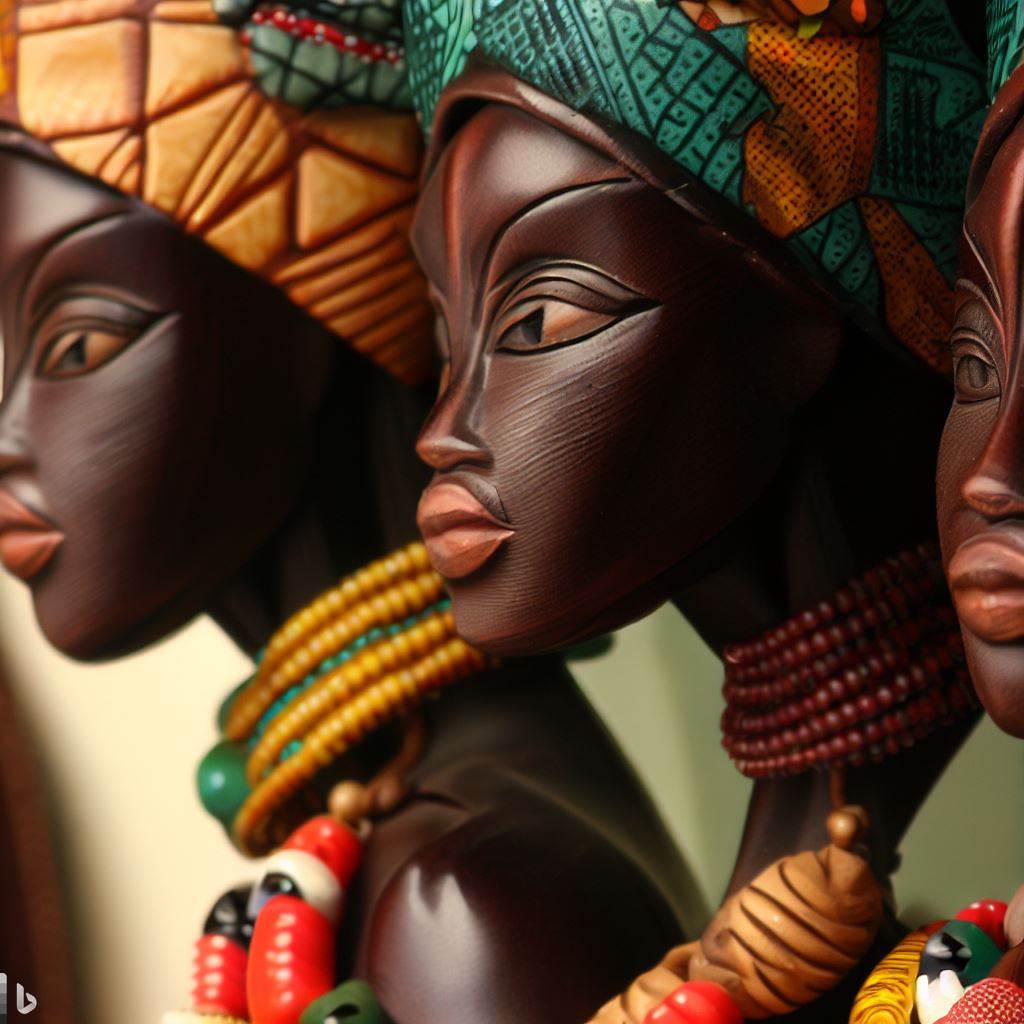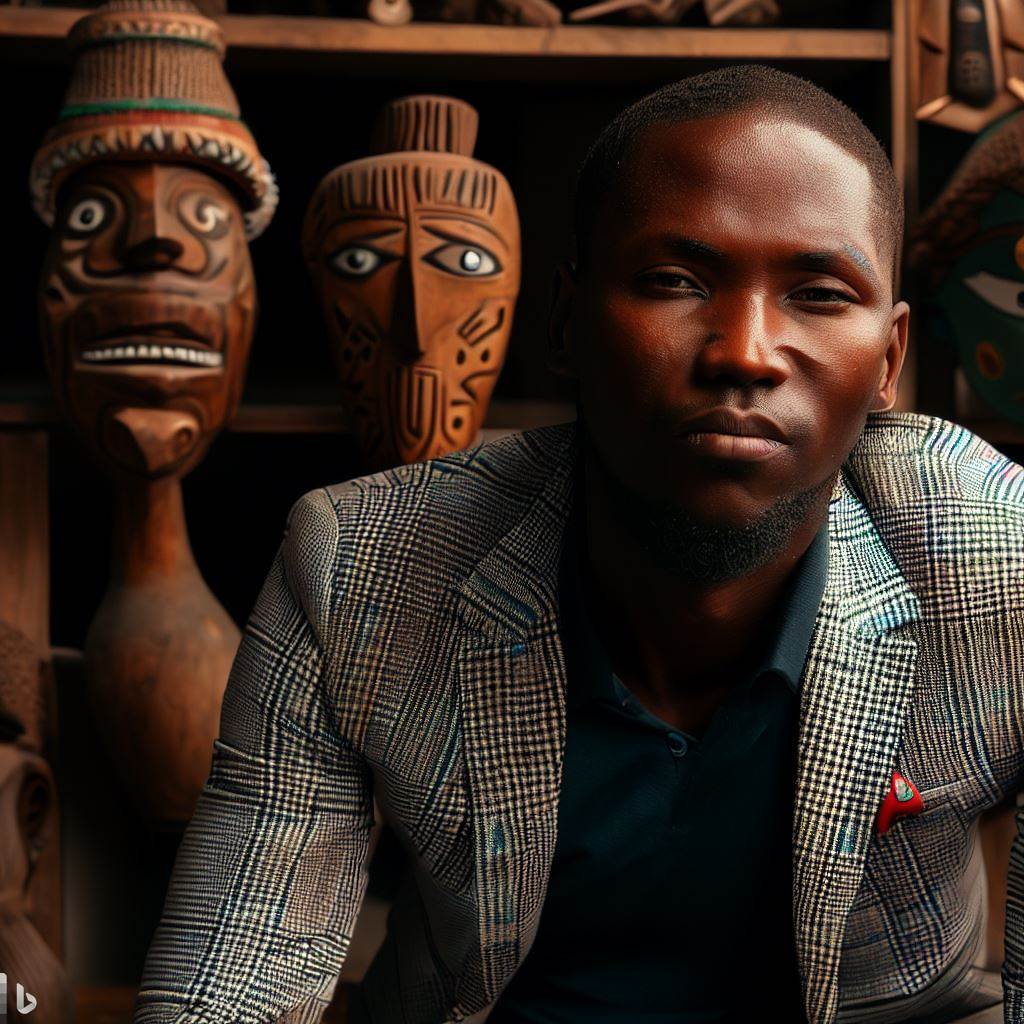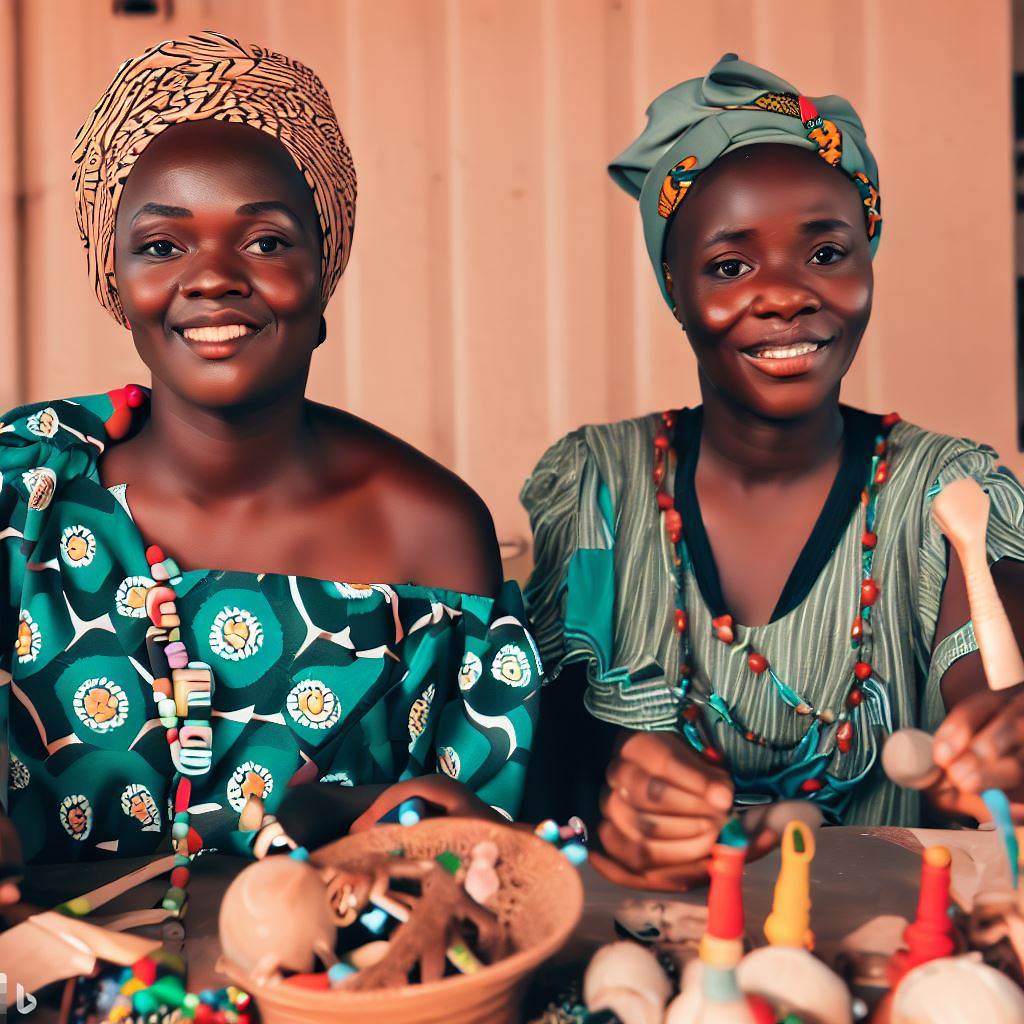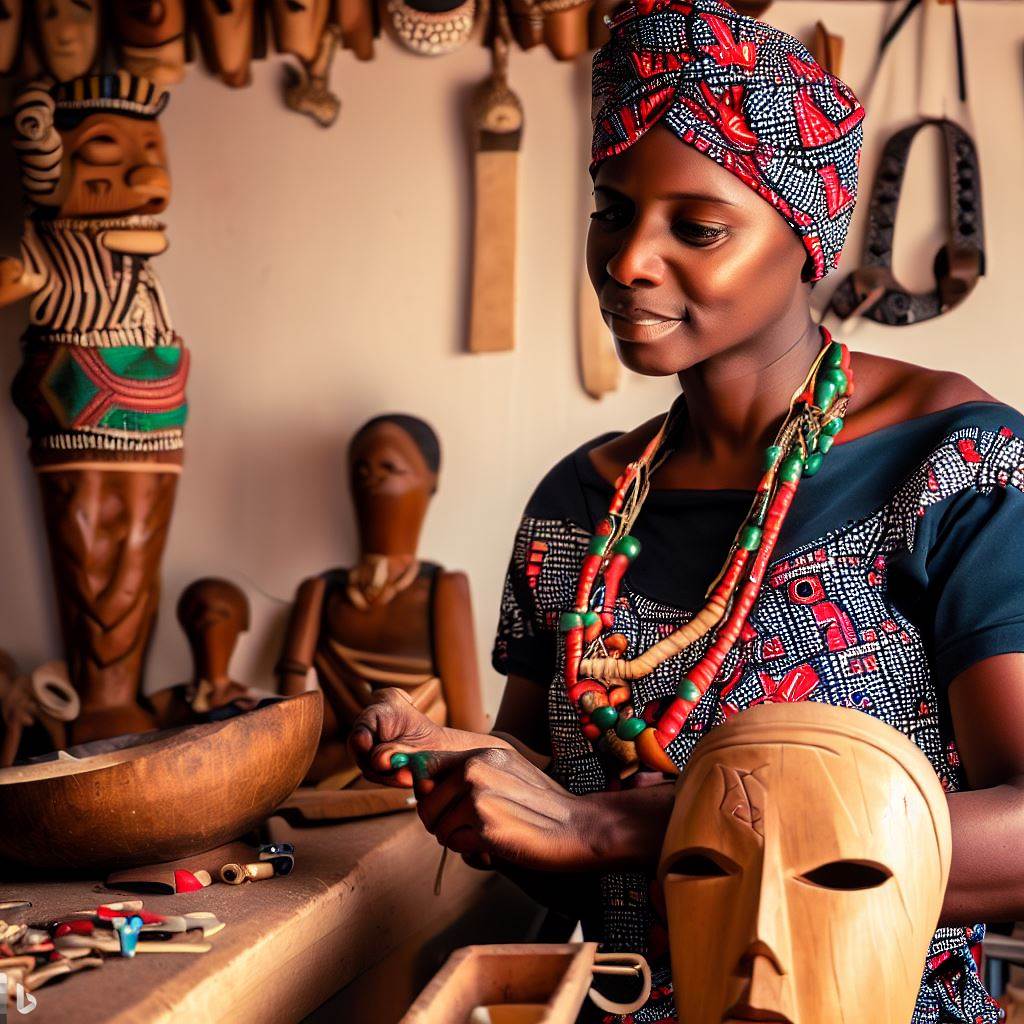Introduction
Nigeria is a West African nation with over 200 ethnic groups and languages. Arts and crafts are an essential aspect of Nigerian culture, reflecting its diversity, heritage, and creativity.
Nigerian crafts showcase the country’s human and material resources, creativity, and history.
They are a way of preserving cultural values, beliefs, and traditions, as well as advancing social and economic development.
Through crafts, Nigerians have gained global recognition for their skills, talent, and innovation.
This blog section explores the crafts of Nigeria, highlighting their diversity and talent in celebrating cultural differences and promoting national unity.
Read: Preserving Nigerian Craftsmanship: A Call to Action
Nigeria’s Diverse Traditional Crafts
Nigeria is a country with a rich cultural heritage and diverse ethnic groups. Each group has distinct traditional crafts that reflect their customs, beliefs, and way of life.
These crafts are an essential part of Nigeria’s cultural identity and a source of pride for its people.
Let’s take a closer look at some of Nigeria’s diverse traditional crafts
Yoruba
The Yoruba people are known for their intricate beadwork and weaving. They create colorful bead necklaces, bracelets, and earrings that are often worn as a symbol of wealth and status.
The Yoruba are also skilled weavers who make stunning fabrics using the traditional loom.
Igbo
The Igbo people are renowned for their pottery. They use local clay to create beautiful earthenware pots, bowls, and plates.
The pottery is decorated with intricate patterns and designs and is often used for cooking, storing food, and as household decorations.
Hausa
The Hausa people are talented leatherworkers who create a range of leather products, including shoes, bags, and belts.
They also make intricate textiles using a traditional weaving technique called ‘taytu’.
Benin
The Benin people are famous for their bronze sculptures and carvings. They create stunning sculptures that depict their kings, gods, and warriors.
These sculptures are highly prized and are often considered the finest examples of African art.
Fulani
The Fulani people are skilled at creating jewelry using silver and gold. They craft beautiful necklaces, bracelets, and earrings that are worn during special occasions and festivals.
The Fulani also make wooden carvings and leatherwork.
In addition to these traditional crafts, Nigeria is also known for its tie-dye fabrics, embroidery, and basket weaving.
These crafts are produced by various ethnic groups across the country and showcase Nigeria’s diverse cultural heritage.
Traditional crafts are an essential part of Nigeria’s cultural identity and are passed down from generation to generation.
These crafts reflect the history and traditions of each ethnic group and provide a link to the country’s past.
In addition to preserving Nigeria’s cultural heritage, traditional crafts also contribute to the country’s economy.
Many of these crafts are sold locally and internationally, providing jobs and income for artisans and their families.
In essence, Nigeria’s diverse traditional crafts are a testament to the country’s rich cultural heritage and the creativity and talent of its people.
These crafts are not just objects, but a living embodiment of Nigeria’s history, traditions, and way of life.
It is important to celebrate and support these crafts to ensure that they continue to flourish and thrive for generations to come.
Read: A Closer Look at Trade Skill Education in Nigeria

New Forms of Nigerian Crafts: Celebrating Creativity and Innovation
As Nigeria continues to evolve and grow, so too do its crafts.
Emerging contemporary artisans and designers reimagine and repurpose the country’s traditional crafts in exciting new ways.
The result is an explosion of creativity and innovation that is helping to keep Nigeria’s crafts relevant and unique.
Here are some of the key ways that Nigerian crafts are evolving:
Emerging contemporary artisans and designers
In recent years, a new generation of artisans and designers in Nigeria emerged, blending fresh ideas with traditional crafts and contemporary aesthetics, enhancing the country’s rich cultural heritage.
These designers are using traditional techniques and materials to create modern pieces that push the boundaries of what Nigerian crafts can be.
Reimagining and repurposing
Many Nigerian crafts are rooted in tradition, but that doesn’t mean they can’t be adapted for modern uses.
As Nigeria continues to urbanize, many artisans are finding new ways to use traditional crafts in urban settings.
Pottery transforms into modern home décor, and contemporary furniture utilizes basket-weaving techniques, for instance.
Creativity and innovation
At the heart of the evolution of Nigerian crafts is creativity and innovation.
As artisans and designers push the limits of what is possible with traditional crafts, they are bringing new life to these techniques and materials.
Whether it’s experimenting with new materials, reimagining old techniques, or creating entirely new pieces, Nigerian crafts are thriving on a culture of creativity and innovation.
Preserving a cultural heritage
Even as Nigeria’s crafts evolve, the country remains deeply connected to its cultural heritage.
Nigerian crafts are a way of preserving that heritage and passing it down to future generations.
By using traditional techniques in new and exciting ways, artisans and designers are keeping Nigeria’s crafts relevant and helping to ensure that they continue to be an important part of the country’s cultural identity.
Celebrating diversity
Nigeria is a diverse country with many different ethnic groups, each with its own unique cultural traditions.
One of the strengths of Nigerian crafts is that they celebrate that diversity.
Whether it’s the intricate beadwork of the Yoruba people or the colorful textiles of the Hausa, each craft reflects the unique cultural identity of its creators.
As Nigeria’s crafts continue to evolve, they are helping to celebrate and preserve that diversity.
In summary, the evolution of Nigerian crafts is a testament to the creativity and innovation of the country’s artisans and designers.
Whether it’s reimagining traditional techniques, repurposing old materials, or creating entirely new pieces, Nigerian crafts are thriving on a culture of creativity and innovation.
By celebrating diversity and preserving cultural heritage, Nigerian crafts will continue to be an important part of the country’s identity for generations to come.
Read: How Nigerian Craftsmen Are Innovating Traditional Arts
Discover More: Trade Skills: Empowering Nigeria’s Youth Population
Impact of Nigerian Crafts on the Economy
According to World Bank data, Nigeria’s economy is struggling to grow with a GDP growth rate of just 2.3% in 2019, predominantly driven by the oil and gas industry.
However, there’s a glimmer of hope in the form of Nigeria’s crafts industry.
Crafts as a source of income
- Nigeria’s crafts industry is diverse, ranging from pottery, weaving, carving, bead-making, and leatherworking, among others.
- These crafts are a source of income for many Nigerians, particularly those in rural and semi-urban areas who lack employment opportunities.
- The industry has the potential to create job opportunities for millions of people and contribute significantly to the economy.
Importance of supporting local artisans and designers
- Support for local artisans and designers is crucial to the growth of Nigeria’s crafts industry.
- The government and private sector must provide financial and non-financial support such as training, access to markets, and funding.
- Supporting local artisans and designers will not only boost the economy but also preserve Nigeria’s rich cultural heritage.
Overall, Nigeria’s crafts industry has the potential to transform the country’s struggling economy.
All stakeholders – government, private sector, and consumers – actively support local artisans and designers to achieve this goal.
Read: Prospects and Challenges: Craftsmanship in Nigeria
Conclusion
Throughout this article, we have explored the diverse and talented crafts of Nigeria. From pottery to weaving, sculpture to beadwork, Nigeria’s craft traditions are vast and varied.
These crafts not only showcase the country’s artistic prowess, but also its rich cultural heritage. As consumers, we have the power to support Nigerian artisans and preserve their crafts for future generations.
By purchasing Nigerian crafts, we can provide economic opportunities for these artists and ensure the continuation of their cultural legacy.
It is important to recognize the value of Nigeria’s crafts and the impact they have on the country’s identity.
These crafts reflect the history, traditions, and creativity of Nigeria’s people. By celebrating and supporting these crafts, we can preserve a vital aspect of Nigerian culture.
Finally, let us appreciate and honor the diverse and talented crafts of Nigeria. Let us make a conscious effort to support Nigerian artisans and their crafts, and encourage others to do the same.
With our efforts, we can preserve the beauty and richness of Nigeria’s cultural heritage for generations to come.




